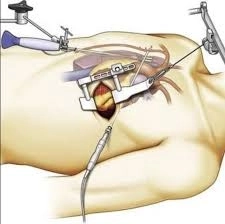
Minimally Invasive Cardiac Surgery: Precise Results with Fewer Complications
Published on: 2025-06-25 | Written by: Prof. Dr. Ahmed Fahmy Al-Wateedi, Senior Consultant and Associate- -
Professor Dr. Ahmed Fahmy El-Weteidy, Senior Consultant of Cardiac Surgery, is among the pioneers in adopting minimally invasive cardiac surgery using thoracoscopic techniques. This advanced surgical method provides a safe and effective alternative to traditional open-heart surgery, offering smaller incisions, faster recovery, and fewer complications.
What Is Minimally Invasive Cardiac Surgery?
Minimally invasive cardiac surgery involves the use of small instruments and a tiny camera (thoracoscope) inserted through small incisions in the chest, avoiding the need to split the breastbone as in conventional open-heart surgery.
According to Dr. Ahmed Fahmy El-Weteidy, this technique provides a clear, magnified view of the heart and is now used in a growing number of procedures, including:
-
Mitral or aortic valve repair or replacement
-
Closure of atrial or ventricular septal defects
-
Removal of benign cardiac tumors
-
Select cases of cardiac assist device implantation
Advantages Over Traditional Open-Heart Surgery
-
Very small incisions (typically 4–6 cm) instead of full chest opening
-
Less post-operative pain
-
Reduced bleeding and lower need for blood transfusion
-
Lower risk of infection and complications
-
Faster recovery and shorter hospital stay
-
Better cosmetic outcomes, with no large visible scar
Dr. Ahmed Fahmy El-Weteidy emphasizes that the choice of technique depends on thorough pre-operative evaluation and diagnostic imaging.
How Is the Procedure Performed?
-
General anesthesia is administered
-
Small incisions are made on the right or left side of the chest
-
A tiny camera and surgical instruments are inserted
-
The targeted repair or replacement is performed within the heart
-
Instruments are removed, and the incisions are closed with cosmetic sutures
The surgery typically takes 2 to 4 hours, with shorter ICU stays compared to conventional methods.
Is Minimally Invasive Surgery Suitable for All Patients?
Dr. Ahmed Fahmy El-Weteidy explains that this technique is ideal for:
-
Younger or active patients
-
Patients with diabetes or weak immunity (to reduce wound risks)
-
Those who desire faster recovery and better cosmetic results
-
Cases without significant heart muscle deformities
However, some complex or high-risk cases may still require traditional open-heart surgery based on detailed assessment.
Dr. Ahmed Fahmy El-Weteidy’s Conclusion
Minimally invasive cardiac surgery marks a true revolution in the field of heart surgery—combining precision, safety, and patient comfort.
Dr. Ahmed Fahmy El-Weteidy emphasizes that successful outcomes rely on the surgeon’s experience, modern surgical equipment, and a well-coordinated cardiac care team.

